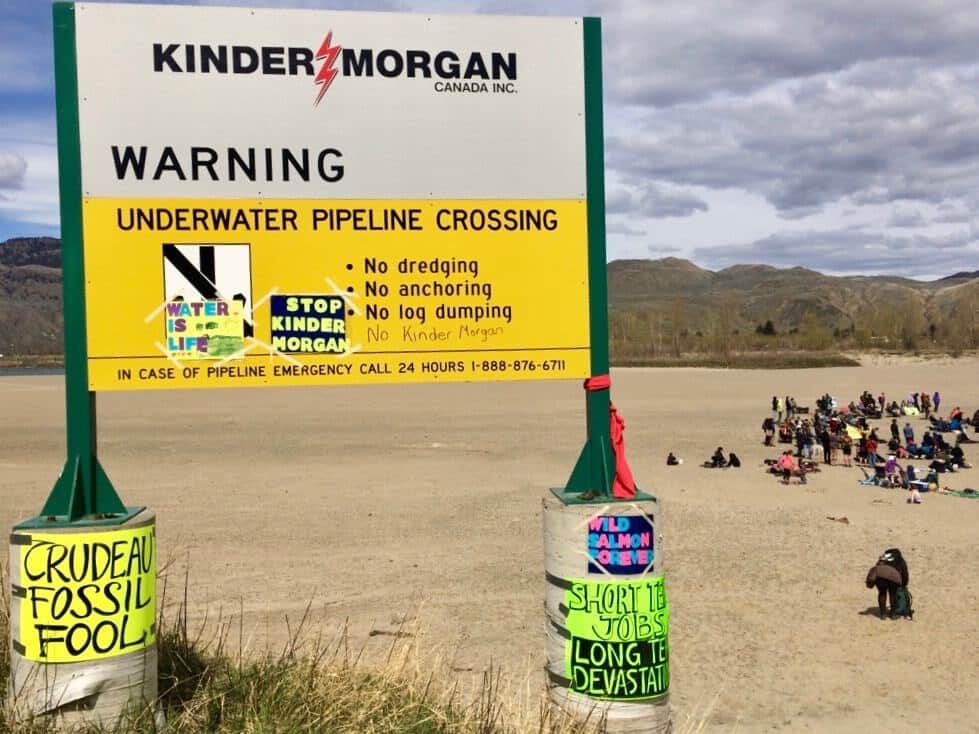
If the Trans Mountain expansion project proceeds, the land, resources and rights of more than 130 Indigenous communities and groups from Alberta’s oilsands to British Columbia’s coast could be affected.
Because of this, there’s a legal obligation to meaningfully consult with them. The pipeline company points to the 43 communities that have signed some form of agreement to show Indigenous support for the project. But many opposed to the project say there hasn’t been meaningful consultation. Six First Nations are arguing consultation was inadequate in court and a single judge ruling in their favour could put the project back to square one.
So, what’s the truth? Reporters across Canada are documenting a range of Indigenous voices that express support, concern and everything in between. These stories sometimes conflict, adding noise to a confusing but important part of the Trans Mountain story and leaving room for industry, anti-pipeline activists and others to make competing claims to support their position.
#TrackingTransMountain aims to present a more clear picture of the state of consultation across all of the communities affected. Building from the hundreds of pages of official documents, existing reporting and interviews with leaders and community members themselves, The Discourse, Aboriginal Peoples Television Network (APTN) and HuffPost Canada hope to offer information to help inform discussions about what’s happening.
In a single interactive place, you can explore each Indigenous community along the pipeline and tanker route to uncover details that you may have had trouble tracking down before.
[iframeresize url=”/general/transmountain-profiles/index.html”]
We’re contacting every Indigenous community identified in Kinder Morgan’s most recent report on Indigenous engagement to the National Energy Board. The database aims to include as many perspectives as possible, but not every community has gotten back to us yet.
In the meantime, we’re filling it in with official documents from the consultation process. We know there are still holes to fill and perspectives missing. If you have information that you want to add, fill in this survey. We’ll continue to add information and report on it as it comes in.
What’s next?
Texas-based Kinder Morgan gave the Canadian government until May 31 to bring certainty to the $7.4-billion project. On May 29, 2018, the federal government announced that they are buying the Trans Mountain pipeline and infrastructure from Kinder Morgan for $4.5 billion.
The question of Indigenous jurisdiction and consultation is not going anywhere. Neither are future decisions affecting the rights of hundreds of Indigenous communities. No single story can fully capture what’s really at stake. But we believe reporters can improve coverage of these complex issues by collaborating with each other and the public.
Follow #TrackingTransMountain on Facebook and Twitter to get the latest updates and stories from our collaborative reporting efforts. [end]
This story was produced as part of #TrackingTransMountain, a collaborative reporting project from The Discourse, APTN, and HuffPost Canada that aims to deepen the reporting on Indigenous communities affected by Kinder Morgan’s Trans Mountain expansion project.
This story was researched and reported by Trevor Jang, Lauren Kaljur, Emma Paling, Lucy Scholey, Brenna Owen, Amber Bernard, and Kendra Perrin. The data interactive was built by Caitlin Havlak with fact-checking and copy editing by Jonathan von Ofenheim. This project was produced by Lindsay Sample.
Editor’s note, May 30, 2018: On May 29, 2018 it was announced that the federal government was buying the Trans Mountain project and infrastructure from Kinder Morgan. This story was updated to reflect that change.
[factbox]
While you’re here…
What is the one thing that is connected to low voter turnout, the spread of infectious disease, decreasing public accountability, and growing distrust of our neighbours? The decline of the news industry. In Canada, nearly 250 media outlets have closed in the past decade, as tech giants Google and Facebook cannibalized advertising revenues from publishers.
That’s why The Discourse is stubbornly dedicated to building a new kind of journalism that serves people, not advertisers. Because Canada needs journalists to provide accurate and unbiased information about polarizing issues, to reflect Canadians’ diverse perspectives, and to hold power to account.
We can only build the new media Canada needs with your help. Become a member of The Discourse to contribute to journalism that’s having an impact. Pay what you can — it only takes a minute. Thanks.
Become a member of The Discourse
[/factbox]



